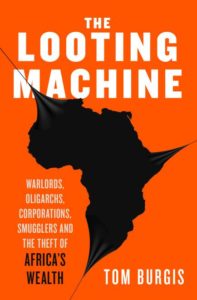
Yet progress on both fronts has been slow and uneven. To understand why, pick up Tom Burgis’s “The Looting Machine,” a bracing look at why a continent blessed with one-third of the world’s hydrocarbon and mineral wealth remains mired in poverty and dysfunction.
A former Africa correspondent for the Financial Times, Burgis goes beyond the tales of spectacular venality among Africa’s “Big Men” — the world’s four longest-serving rulers are in African countries bursting with oil or minerals — to explain how the continent’s “resource curse” is sapping its development.
Nigeria is a case in point. Africa’s biggest oil producer gets more than 90 percent of its foreign earnings and two-thirds of its tax revenue from oil exports. Yet there are many reasons why that hydrocarbon bounty is a mixed blessing.
For starters, it can drive up the value of a nation’s currency, making other exports less competitive and imports more attractive. As Burgis points out, textiles used to be Nigeria’s most important manufacturing industry. But cheaper Chinese imports smuggled in by Nigerian gangs (an illicit trade worth more than $2 billion a year) have devastated the industry — one example of why Africa produces just 1.5 percent of global manufacturing output, despite its abundance of cheap labor.
Billions of dollars in oil revenues are also a tempting pot of money for bent politicians. One 2012 report said corruption had swallowed up $37 billion worth of Nigeria’s oil money over the last decade. That surpasses the annual economic output of more than half the nations in Africa as well as Nigeria’s annual federal budget.
Such corruption has other toxic effects. Dirty money from bribes and kickbacks has to be laundered, and because those doing the cleaning don’t care so much about profit or productive investment, their infusions of cash distort the value of assets.
Nigeria’s reliance on oil for tax revenues also creates a perverse political dynamic: As Burgis puts it, “the ability of rulers of Africa’s resource state to govern without recourse to popular consent.” Instead of having to do right by taxpayers to win their votes, politicians focus on controlling and dispensing mineral wealth to bolster their patronage networks.
Read the full story at chicagotribune.com


